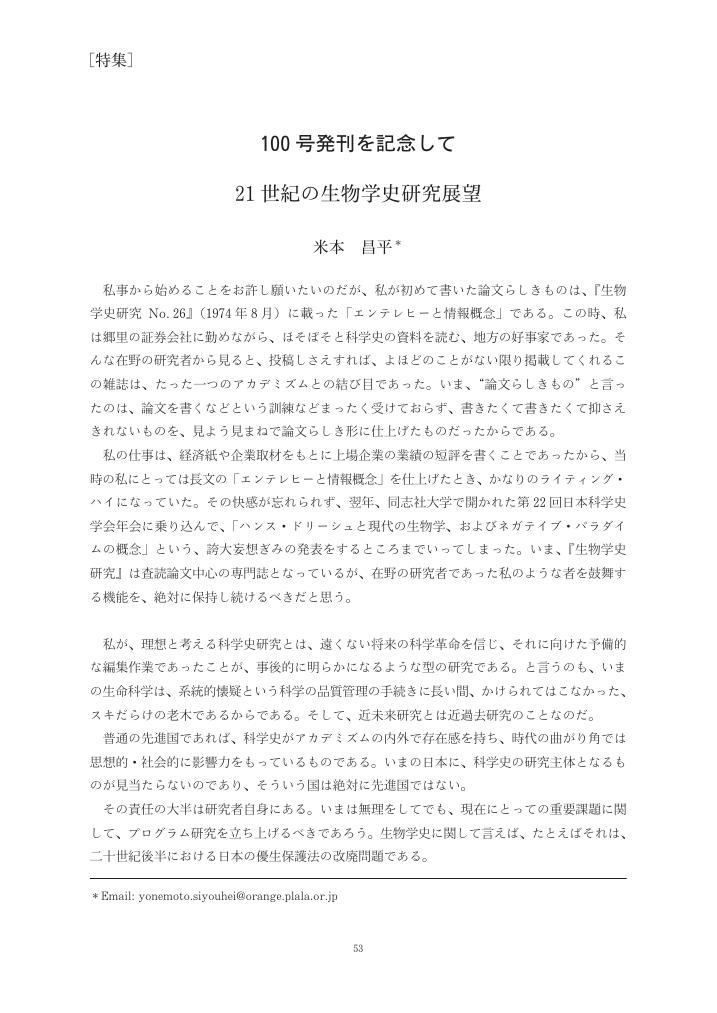32 0 0 0 OA 四大公害裁判期における疫学的因果関係論 : 1967-1973
- 著者
- 住田 朋久
- 出版者
- 東京大学教養学部哲学・科学史部会
- 雑誌
- 哲学・科学史論叢 (ISSN:13446185)
- 巻号頁・発行日
- vol.13, 2011-03
10 0 0 0 OA 『衛生寿護禄(すごろく)』の「かなしき」マスク ――1884年、大日本私立衛生会の個人衛生啓蒙
- 著者
- 住田 朋久
- 出版者
- 日本科学史学会
- 雑誌
- 科学史研究 (ISSN:21887535)
- 巻号頁・発行日
- vol.61, no.302, pp.176-180, 2022 (Released:2023-11-17)
7 0 0 0 OA 科学的助言とパブリックコミュニケーション 日本の新型コロナ対応が提起する新たな課題
- 著者
- 加納 寛之 住田 朋久 佐藤 靖
- 出版者
- 研究・イノベーション学会
- 雑誌
- 研究 技術 計画 (ISSN:09147020)
- 巻号頁・発行日
- vol.36, no.2, pp.128-139, 2021-07-19 (Released:2021-07-19)
- 参考文献数
- 30
Experts have played active roles in the Japanese government's efforts to respond to novel coronavirus infections. Those who participated in scientific advisory organizations not only expressed their opinions on the government's policies and measures based on their scientific knowledge, but also advised the government on the major directions and strategies to be taken, and took on public communication to encourage people to voluntarily change their behavior. However, given the current institutional framework, such actions of scientific advisors in combating novel coronavirus infections go beyond the prescribed roles and responsibilities of scientific advisors as brokers between science and the government. Public communication is an important means of fostering public trust and consent, which are essential for ensuring the effectiveness of policy responses based on scientific advice. Therefore, there is an urgent need to incorporate public communication more explicitly into scientific advice activities. This paper reviews Japan's national efforts for scientific advice, which accelerated after the Great East Japan Earthquake, as well as efforts on public communication by scientific advisors and advisory organizations, and then points out unresolved issues on the relationships between scientific advice and society, in light of Japan's recent experience with new coronavirus infection.
4 0 0 0 IR 四大公害裁判期における疫学的因果関係論--1967-1973
- 著者
- 住田 朋久
- 出版者
- 東京大学教養学部哲学・科学史部会
- 雑誌
- 哲学・科学史論叢 (ISSN:13446185)
- 巻号頁・発行日
- no.13, pp.45-73, 2011
- 著者
- 住田 朋久
- 出版者
- 日本科学史学会
- 雑誌
- 科学史研究 (ISSN:21887535)
- 巻号頁・発行日
- vol.61, no.301, pp.71-77, 2022 (Released:2023-11-17)
1 0 0 0 OA マスクの歴史と人類学にむけて、2020年
- 著者
- 住田 朋久
- 出版者
- 日本科学史学会生物学史分科会
- 雑誌
- 生物学史研究 (ISSN:03869539)
- 巻号頁・発行日
- vol.101, pp.3-8, 2021-12-21 (Released:2023-01-17)



